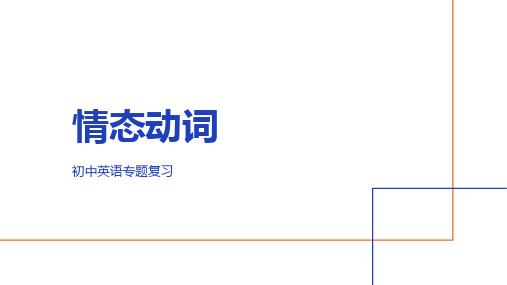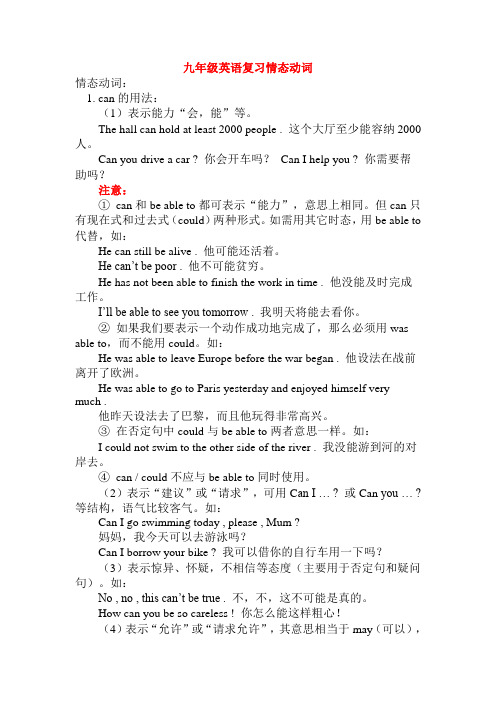人教版 中考初中英语情态动词精讲PPT课件
人教版九年级英语上册教学课件:Unit8 单元语法归纳 情态动词(共10张PPT)

He may know the way to the post office,but I am not sure. 他可能知道去邮局的路,但我不 确定。
The notebook must be Li Ming’s. His name is on the cover. 这笔记本一定是李明的。封面上
3.难点 (1)can (could)与 be able to can 只用于现在时,过去时用could, 这两个词不用于其他时态;be able to 可用于任何时态。 如:She can / is able to drive a car.她会开车。 He could / was able to play the piano at the age of ten.他十岁时就 能弹钢琴。
。
6、does not mean teaching people to kow what they do not know ; it means teachng them to behave as they do not b ehave. 教育不在于使人知其所未知,而在于按其所未行而行。2021年11月上午3时17分21.11.2403:17November 24, 2021
1.情态动词表示说话人的情绪、态度或 语气的动词,不能单独作谓语,只能和 实义动词原形一起构成谓语,无人称和 数的变化。否定句一般在其后面加 not, 一般疑问句将情态动词提到句首。如: You may finish your homework at school. 你可以在学校完成你的作业。(肯定句) You may not finish your homework at school.
— No, it _____ be true.
A. Can; can’t mCustn’t
情态动词(20张PPT)初中英语专项复习课件

(1)只作情态动词:must;can/could;may/might;ought to
(2)既可作情态动词又可作实义动词:need,dare
((34))既 具可 有作 情情 态态 动动词词某又些可特作征稿稿定助:定hPa动PPvTP,e词T/海h:量asd素ha材tlo持l;/s续hha更odublde;twteirll/would
【知识拓展】
1. must的一般疑问句,肯定回答为Yes, ...must.;否定回答为No, ...needn’t./No, ...don’t have
to.—Must I clean the classroom now? 我必须现在打扫教室吗?
—Yes, you must. 是的,你必须。/No, you don’t have to. /No, you needn’t. 不,你不必。
He promised he would never smoke again. 他承诺他再也不吸烟了。
Their English teacher would tell them stories in
表示过去反复发生的动 English after class.
作或某种倾向
他们的英语老师总是在课后用英语给他们讲故事
新,上千款模板选择总有一
款适合你
知识点二:情态动词的特点
情态动词的特点: (1)情态动词无人称和数的变化(have to除外); (2)情态动词后接动词原形; (3)情态动词的否定式是在其后加not; have to除外 (4)具有助动词的作用,可用来构成否定句、疑问句及用于简明答语; (5)个别情态动词有现在式和稿过定去PP式T两种形式,过去式用来表达更加客气、委 婉的语气,时态性不强,可稿用定于PPT过,海去量、素材现持在续更或将来。
情态动词讲解精ppt课件

will/would
详细描述:will 表示现在的意愿或 预测,would 表示过去的或虚拟 的意愿或预测。
1. I will help you with your project.(我会帮助你完成你的项 目。)
总结词:表示意愿或预测
例句
2. They would have gone to the party if they had known about it earlier.(如果他们早点 知道,他们就会去参加聚会。)
表示意愿
情态动词+动词原形,如 would like to go,表示 某人想要去。
形式变化
基本形式
情态动词的基本形式包括 现在时、过去时和将来时 。
过去式
情态动词的过去式通常是 在基本形式后面加-d或ed,如could have done 、should have done等。
将来时
情态动词的将来时通常是 在基本形式后面加-will或shall,如will be able to 、shall have to等。
may与might的区别与联系
总结词
may表示现在的许可或可能性;might表示过去的可能性或许可。
详细描述
may用于肯定句中,表示许可或可能性,例如“You may use this room.”(你可以使用这个房间。 )“The book may be in the library.”(这本书可能在图书馆里。)might表示过去的可能性,常 用于过去时态的句子中,例如“He might come tomorrow.”(他明天可能来。)
未必、很难说
She might not agree with us.
表示虚拟语气
人教版九年级Unit8 情态动词表推测讲解(共20张PPT)

A. can go C. may have gone
B. may go D. must go
典例精析
3. — Where is Bill? — He___D____ in the library now.
A. can read B. may read C. must read D. might be reading
e.g. He must be American. The book could be Mike’s. She may be a Chinese. She can’t be a teacher.
知识讲解
二、情态动词表推测的不同时态
1. 情态动词 + 动词原形 → 将来
e.g. She must arrive before 5. Paul might go to Shanghai next month.
知识讲解
③ could / might 也许,或许; (把握较小) e.g. Peter could / might have gone to Beijing. I’m not sure.
④ can 表示理论上的可能性 e.g. Smoking can cause cancer.
知识讲解
2. 否定句: may not / might not, can’t / couldn’t ① may not / might not 可能不; (把握很小) e.g. It’s Sunday. He may / might not be at home.
典例精析
1. —(海南中考) Mr. Zhou can’t find his ID card anywhere. It___C___be lost.
人教版九年级英语下册《情态动词》课件_0

考点二:表推测语气的情态动词
表推测性的情态动词有: must may can’t
must :表有把握的肯定推测( 100%) may :表没把握的推测。( 50%) can’t :表有把握的否定推测。( 0%)
1. —Whose is the pencil box?
—It_______ be Tom's. Look at his name on the
cover! 【2012河北】
A.can B. may
C. must
D. need
2. —How nice the building is! What is it for? —It _____ a hotel. But I’m not sure. 【2012 山东德州】
A. must be B. have to be C. may be D. can be
A. Must; mustn't
B Can; mustn't
C. Must; needn't
D. May; needn't
5. —______ I try on those shoes in the window?
—______. They are just on show. 【2012 呼和浩特】
考点三:情态动词开头的疑问句的问答
句型 Can I… Could I… May I …
肯定回答 Yes, you can .
Yes, you may.
否定回答 No, you can’t .
No, you can’t.
Must I… Yes, you must. Need I… Yes, you must.
ห้องสมุดไป่ตู้
九年级英语情态动词知识点讲解PPT课件

could 意为“很可能”,语气强于may
The story book could be Li Ping's.He likes reading stories.
must can
意为“必定,一定”,语气最 强烈
表可能性,时常用在疑问句中
The book must be Lucy's.Her name is on the cover.
A.can;may
B.must;have to
C.may;must
D.mustn't;must
【温馨提示】专题训练见《强化训练册》B53
—Yes,I can.
A.must
B.should
C.need
D.can
( B )7.(2019·孝感)—May I join the art club,Dad?
—If you have interest,you ________.
A.should
B.can
C.have to
D.must
( C )8.(2019·兰州)The magazine ________ Lucy's.We can see her name on the
—Where can my pen be?—It may be in your desk.
2.情态动词表示否定推测的用法 (1)can't 表示否定推测,语气强烈,意为“一定不;不可能”。如: That can't be Miss Gao.She has gone to Shanghai.那不可能是高老师。她 去上海了。 (2)may not 也表示否定推测,语气不确定,意为“可能不是”。如: It may not be my pen.这可能不是我的钢笔。
初中英语语法-情态动词PPT课件

2021
10
四、 shall
1) shall 用于第一人称,征求对方的意见。 What shall we do this evening? shall I clean the room for you?
2021
11
2) shall 用于第二、三人称,表示说话人给对方的命令、警 告、允诺或威胁。
We should obey traffic laws. You shouldn‘t watch TV every day。 You shouldn’t have made this kind of silly mistakes. Tom should have brought his report today. 这时它可以和 ought to, be supposed to 互换使用
You can never imagine such a gentleman should be so rude to a lady.
2021
15
六: will 和would
1)表示意志或意愿:决心,愿意,…… We will do our best to save the child. 我们会尽力
I’ll not be able to come this afternoon. 当表示“经过努力才得以做成功某事”时应用be able to,
不能用Can。如:
He was able to go to the party yesterday evening in spite of the heavy rain.
Did anyone dare (to) admit it?有人敢于承认吗?
He did not dare (to) leave his car there. 他不 敢把车停放在那里。
人教英语九年级全册Unit8情态动词(共30张PPT)

记忆口诀:现将用动原,过去用完成
推测正在发生
在情态动词后,用______b_e__d_o__in__g______表示 对__现__在___正__在__进__行__的___事__情__的__推___测
例:He must be sleeping at home . 他一定现在正在家睡觉。
A. can be able to
B. be able to
C. can able to
D. are able to
3. Are you ____A____ predict(预测) what will happen in the
years ahead?
A. able to
B. be able to
C. be able for
c. 情态动词后跟动词原形.
He can fly.ing.
2 义务 :
“must” 表___必_须_____.
表示意思上的区别 适用时态的区别 否定形式的区别
must
必须(主观)
现在时态: must 将来时态: must
needn’t
have to
必须(客观)
现在时态: have/has to 将来时态: will have to 过去时态: had to don’t /doesn’t/didn’t have to
例:--Please clean your chimney next year.
--Ok, I will.
--Don--Ok, I won’t.
强烈指责
___c_a__n_’__t____---__不__能___ 例:You can’t do like this. _s_h_o__u_l_d_n__’__t_---_不__应__该__ 例:You shouldn’t spit here. _o_u_g__h_t__n_o_t__t_o---_不__应__该__ 例:You ought not to drink so much. __m__u_s_t_n_’___t__---__不__准___ 例:You mustn’t play in the street.
人教版九年级英语复习情态动词ppt课件

九年级英语复习情态动词情态动词:1. can的用法:(1)表示能力“会,能”等。
The hall can hold at least 2000 people . 这个大厅至少能容纳2000人。
Can you drive a car ? 你会开车吗?Can I help you ? 你需要帮助吗?注意:①can和be able to都可表示“能力”,意思上相同。
但can只有现在式和过去式(could)两种形式。
如需用其它时态,用be able to 代替,如:He can still be alive . 他可能还活着。
He can’t be poor . 他不可能贫穷。
He has not been able to finish the work in time . 他没能及时完成工作。
I’ll be able to see you tomorrow . 我明天将能去看你。
②如果我们要表示一个动作成功地完成了,那么必须用was able to,而不能用could。
如:He was able to leave Europe before the war began . 他设法在战前离开了欧洲。
He was able to go to Paris yesterday and enjoyed himself very much .他昨天设法去了巴黎,而且他玩得非常高兴。
③在否定句中could与be able to两者意思一样。
如:I could not swim to the other side of the river . 我没能游到河的对岸去。
④can / could不应与be able to同时使用。
(2)表示“建议”或“请求”,可用C an I … ?或Can you … ?等结构,语气比较客气。
如:Can I go swimming today , please , Mum ?妈妈,我今天可以去游泳吗?Can I borrow your bike ? 我可以借你的自行车用一下吗?(3)表示惊异、怀疑,不相信等态度(主要用于否定句和疑问句)。
(完整)中考英语专题复习情态动词精品PPT资料精品PPT资料

7. —Who is the must 代表责任与义务,否定回答须用need not; boy over there? Is it John? — tAa.lNlmeoru., sittn_’__t_____Bb.emhaimy .nJoot hn is much —s(n作nnJ以"imn情n—以?作s_hoeeeee意u_Y4行n态Yn行goheeeees_e)ee思eeundddddt为 动 为_teessnlnnnntdi是_,,sidd’’’’’mnt意动词动tttt_cH引引;;mg“uo_mme为词的词s导导_mul我auetD_c“时基时表eys的的nh_.可t.i应,本,示BBBntI疑疑a以,.t..该al有用有肯lp问问Bek怎l”r人法人e定e.句句.么ai。称,称的ts,,样eo和集和猜.u肯肯吗t数中数测?定定?"的在的,”"回回较I'变变c表m答答口a化化示ns用用语、o,,否rmm化rsy后后定uuh,。ssoy常常的ttuo,,lu跟跟d猜否否_、不不_测定定n_定定用e_用用e_式式d_cnn及a_ee作作n_ee其'_宾宾ddt。.否nn语语oo定tt,,。。用只只法用用。于于肯肯定定句句中中。。 C8.. —caCna’ntyou play DF.rinsebeeden, J’aty? C例情d— nMnn(例moeeehua如态Y2如neeeisyl)e’ddddtt: 动 :snnrh表e,’’aI词HttnI;;vc示e_mm_的ea__n猜nuuDt_基_eoss_p.测_ettD_本l_da_,._yB用n__t意o._h_法Bt.e为pc.,ogla“mu集yit一ewa中rhi定.teh在r”fecir.a,en.语、气sh比oumlda、y肯ne定ed,及只其用否于定肯用定法句。中。 —Yes, I ________. It’s easy. 作行为动词时,有人称和数的变化,后常跟不定式作宾语,只用于肯定句中。
最新人教版英语中考复习话题情态动词复习 (共27张PPT)教育课件

11
2. may, might 的用法
B. 表示推测 may表示的可能性比can小,might可作may的过去式,也可以替代may说明现在的情况,可 能性比may更小。 • We may go camping this Saturday. 本周六我们可能去露营。 • Peter might phone. If he does, could you ask him to ring later? 彼得或许会打电话。如果他打电话的话,能否告诉他晚些时候再打?
5
1. can, could 的用法
➢ can与 be able to ①can与 be able to表示泛指过去的能力时,二者通用。 I could/ was able to swim well when I was only six years old. 我六岁时便游泳游得很好了。 ②指过去某时或某个时刻设法做成某事不用 could,用was/ were able to I could hardly understand her Japanese, but I was able to read her face. 我几乎不懂她说的日语,但我却读懂了她的表情。
13
3.must, have to 的用法
1. must, have to 的用法
must 的否定形式为 must not, 其缩略形式是 mustn't, 只有一种时态形式。have to 可用于多种时态,其 否定式,疑问式都要借助助动词构成。have to 各种形式如下(以you和she 为例)
否定式 may not might not
缩略否定式 mayn't mightn't
A. 表示请求,允许
may和mght表示“许可”比can和 could更正式, might含有试探和犹豫不决的意思。表示 给予许可时,一般用may不用mght; may not用来表示拒绝或禁止。
中考英语语法讲解课件-情态动词课件

2.can和could --Could I borrow your dictionary? --Of course you ____________.[陕西省] A. can B. must C. should D. will [答案]A。[解析] 上文的could并不表示过去,而只是一种委婉的说法,所以答语用can更礼貌些。 --Listen! Is Tom singing in the classroom? --No. It ________be Tom. He has gone to Paris. [长沙市] A. may not B. needn't C. can't [答案]C。[解析] 因为汤姆不在这里,所以不可能是他。 一Mary,__________you speak Chinese? 一Yes,only a little. [北京市] A must B need C may D.can [答案]D。[解析] 考查情态动词,“玛丽,你会说英语吗?…“是的,会一点”。故选D。can表示能够
He may be right他可能对 He can’t be right他不可能对
必须
肯定
肯定回答:yes, … must 否定回答:no, you needn’t/ no, you don’t have to
can多用于疑问句和否定句,表示怀疑或不相信等态度; Must表示推测时,不能用否定句
1Schools _________allow students at least one hour a day for sports. A. would B. might C. should D. could [答案]C。[解析] 此处用情态动词should的用法。should表示“应当…‘应该”的含义比其他三个词更强些。 2.Bob,may I __your MP4? 一Sure.But you'd better not _________it to others.[A.lend;lend B lend;borrow C borrow;borrow D.borrow;lend [答案]D。[解析]本题考查动词borrow和lend的区别. 由语境可判断前者是借入,用borrow后者是借出,用lend。 3.--What about playing football this afternoon, Sam? --I would rather __ at home than __ football. It's too hot outside. A. stay; playing B. stay; play C. to stay; to play D. to stay; playing [答案]:A。[解析]本题考查了would rather的固定短语的应用。Would rather do A than do B和做B比起来,宁愿做A。
人教版中考英语复习之情态动词课件

注意情态动词表客气的用法及其在一般疑问句中的问与答。
1. Nobody _____ do it. Let me _____ .
He can drive.
I can’t catch up with Jim. can与be able to二者都表示“能够”,区别是:can只有现在时 和过去式,而be able to可用于各种时态。如:
I’ll be able to speak French in half a year.
He hasn’t been able to finish it on time.
3. “ Can you answer this question in English?” “ Sorry, I _____.”
A. needn’t
B. may not
C. can’t
D. mustn’t
4. “ _____ I borrow your dictionary?” “ Certainly, here you are.”
3.must (1)表示义务,命令或必要。 eg. Soldiers must obey orders. 战士必须服从命令。 We must be strict with ourselves. 我们必须严格要求自己。
(2)must表示肯定的推测。如: eg. The light is still on, so he must be at home.
②will用于疑问句中,常用在第二称时表示说话人向对方提出“请求” 或“询问”如: Will you please tell her the news when you see her?
- 1、下载文档前请自行甄别文档内容的完整性,平台不提供额外的编辑、内容补充、找答案等附加服务。
- 2、"仅部分预览"的文档,不可在线预览部分如存在完整性等问题,可反馈申请退款(可完整预览的文档不适用该条件!)。
- 3、如文档侵犯您的权益,请联系客服反馈,我们会尽快为您处理(人工客服工作时间:9:00-18:30)。
12
二、常见情态动词用法
(五) will 1. 表意愿用于各种人称。时态为一般将来时。 I will do anything for you. 2. will在疑问句中用于第二人称,表示询问对方的意愿或向对方提出请求。 Will you close the window?
13
二、常见情态动词用法
9
巩固练习
1、—________ you pass me a pen? I’d like to write down the phone number. —Sure. Here it is. A. Can B. Need C. Might D. Must
2、You _______ worry about me. It’s nothing serious. A. can’t B. mustn’t C. needn’t D. won’t
5
二、常见情态动词用法
(三) must 1. must表示主观看法,意为“必须,一定” e.g. You must go and see a doctor because you have a fever.
常考句型:
---Must I ......? ---Yes,you must. ---No, you needn't. / No, you don't have to.
A.must
B.can C.should
D.have to
7
二、常见情态动词用法
(三) need 1. 当need作为情态动词时,表示“需要,必须”,用法和其他情态动词一样,主要用在 否定句和疑问句中。 肯定回答为:must 必须 否定回答为:needn't =don't have to 没有必要,不必 ——Need I open the door? ——Yes, you must. ——No, you needn't/No, you don't have to.
2.表推测。“可能”,常用于否定句和疑问句中,此时can‘t意为“不可能”。 e.g. --Can the news be true? 这个消息会是真的吗? --No, it can't be true. 不可能是真的
--I think Miss Gao must be in the library. She said she would go there --No, she_____ be there, I saw her just now.
肯定回答: Sure, I’d love / like to. That sounds good!
否定回答: Sorry, I can’t. I’d love to, but I’m afraid I have no time.
4
二、常见情态动词用法
(二) could 1.can的过去式,意为“能、会”,表示过去的能力。
中考复习情态动词
1
一、情态动词的定义和特点
情态动词的定义: 情态动词表示说话人对某一动作或状态的态度。
情态动词共有的性质是:
1.不能单独作谓语,须和行为动词或系动词连用共同构成谓语 2. 无人称和数的变化(have to除外) 3. 后接动词原形do/be (这一点很重要) 4. 具有助动词作用(可用来构成否定句,疑问句)
11
二、常见情态动词用法
(四) may; maybe; may be
1. She___m_a_y_b_e___ a nurse. (她也是是一个护士) 2. __M_a_y_b_e_ you are right. (也许你是对的) 3. Lily __m__a_y_ know it. (Lily也是知道它。) 4. ______ I take a photo of you? ( 我可以给您拍
8
二、常见情态动词用法
(三) need
2. 难点:need做实义动词 和 情态动词 的区别 need除了做情态动词,还可以做实义动词 做实义动词时,need有第三人称,单复数的变化。 need + n. 需要某物 I really need a job. Plants need light in order to survive. need to do sth. 需要做某事(主语通常是人) I need to buy some books You need to listen carefully in class.
我们必须输! 我们输的起! 我们可能会输的!
We may lose! We must lose! We can lose!
二、常见情态动词用法
(一) can 1. 表能力。“能,会”。此时否定can’t,意为“不会,不能”。
e.g. She can swim fast, but I can’t. I can't play the piano.
17
1. I thought you __________ like something to read, so I have brought you some books.
A. may B. might C. could
D. must
2.—When can I come for the photos? I need them tomorrow afternoon.
难点:must与have to区别
must “必须”侧பைடு நூலகம்于个人意志和主观上的必须做某事,具有强制性的意味 have to “不得不” 强调客观上的原因迫使不得不去做某事 have to有人称和数的变化,当为第三人称单数时,用has to e.g. I know I must study hard.
My brother was very ill, so I had to call the doctor in the midnight.
2.主语+would like to~ 表示“想要……”的意思上,与…want to~意思一 样,但用此句型较客气。 e.g. I want to ask you a question. =I'd(I would)like to ask you a question.
3.Would you like~? 表示请求、劝说,是很客气的说法。 e.g. Would you like a cup of tea?
14
二、常见情态动词用法
(六) could, would, should
would的用法: a. 是will的过去式;表过去将来。 b. 请求建议时,用于疑问句,would比will更委婉。
Would的用法句型:
1.Would you~?和Will you~? 这两个句型皆表示客气的请求、劝说……,但Would you~?更客气些。 e.g. Would you tell me the way to the station?
15
二、常见情态动词用法
(六) could, would, should should是shall的过去式,作为情态动词时,则表示“应该~” 1. should(应当、应该)用于所有人称,与ought to~同义。
You should wait a little more. =You ought to wait a little more.
3、— May I go to the cinema,mum? —Certainly, but you _______be back by 11 o'clock. A. might B. mustn’t C. can’t D. must
4、The man in the office ___ be Mr. Black, because he went home just now.
6
二、常见情态动词用法
(二) must
2. must 表示有把握的推测,用于肯定句。 e.g. The light is on, so he must be at home now. Jane must be at home, because I saw her walk into her house.
—They __________ be ready by 12:00.
A. can
B. should C. might
May I borrow your pen?
b.可能、或许 (谈论可能性、表示推测,一般用于肯定句)
Tomorrow I may go shopping. He might be our new teacher.
might在表示推测时,不表示时态,只是说明可能性比 may还要小。
C. 用于祈使句中表祝愿 e.g. May you succeed!
e.g. He could write poems when he was 10. 他十岁时就会写诗。 2.could在疑问句中,表示委婉的语气,此时could没有过去式的意思。 e.g. Could you do me 你能帮我个忙吗?
—Could I use your pen?我能用一下你的钢笔吗? —Yes, you can.可以。(注意回答)
2.在表示要求、命令时,语气时用should(应该)。 ~had better(最好)、~must(必须)逐渐加强。
